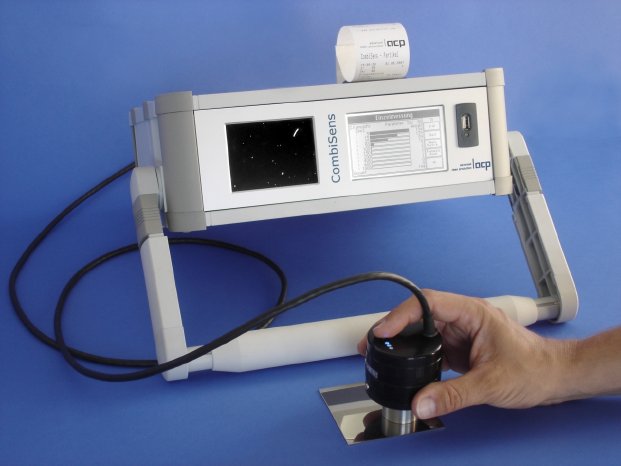Residual pollution impairs the function of technological systems, and the resulting increase in the reject rate raises production costs. Simple inspection of surfaces for pollution is therefore an essential prerequisite for efficient production. With the innovative “CombiSens”, the Esslingen (Germany) company acp – advanced clean production GmbH – offers an inspection system for combined recognition and quantification of particle pollution, for example swarf and dust, and of coating films, such as oils, greases, coolants or anti-corrosion agents. The portable, easy-to-use measuring system permits quick, reliable, non-destructive inspection of component surfaces right in the production area or workshop. It can also be integrated directly in production lines as a sensor module. With its adjustable threshold values, the CombiSens can be adapted to the most varied measurement and inspection tasks. This means that both production-specific pollution in manufacturing and the results of cleaning processes can be investigated on almost all technical surfaces. The compact CombiSens system can also be used to monitor the cleanliness of production equipment, units and systems, and of the production environment.
Reliable particle recognition on widely varying materials, as defined in ISO 16232 (VDA 19)
Hitherto, the lack of sufficient contrast between particles and surfaces that are not optically smooth has prevented reliable results in the case of automatic particle detection on such surfaces. With the CombiSens, acp have solved this problem by using side lighting of the surface. With this, the necessary contrast for sensory detection can be created on a wide range of materials with optically smooth and non-smooth surfaces. This allows highly accurate, reliably reproducible measurements to be made at the touch of a button. The measuring head is set on the surface to be inspected. In less than five seconds, the measuring system then automatically calculates the number and size of any particles larger than 2 µm, and shows their exact position and outline in the live image on the integrated display. The measurements are displayed in parallel. The classification of the particles is made according to ISO 16232-10.2 (VDA 19) - Road vehicles - Cleanliness of components of fluid circuits, for example, though it is possible to integrate other standards. This allows confident statements to be made about the number, size and size distribution of the particles without using a microscope or taking indirect samples, such as by rinsing the surface and then evaluating the filter.
Inspection of pollution and protection films
The inspection for film is based on the relative change in luminance that results from thin films on the surface. A set-point value is established on a reference surface and stored in CombiSens. Variable alarm thresholds can be defined to evaluate deviations from this reference quickly und simply. In ensuing comparative measurements, conclusions about pollution with films of oil, grease or coolant can then be drawn immediately. Immediate evaluation of protective films, such as anti-corrosion coatings, is also possible with the CombiSens.
Documentation of measurements
The CombiSens is fitted with a thermal log printer for documenting the measurements. There is a software program for transferring and storing data to the PC. It is also possible to store measurements and live images on a USB stick.
Its versatile technology, simple handling and compact design make the CombiSens inspection system by acp the ideal solution for companies that must ensure clean surfaces on the product and in the manufacturing environment. Further information is available from acp – advanced clean production GmbH, Röntgenstraße 30, 73730 Esslingen, Germany, www.acp-micron.com.
Thank you in advance for sending us a specimen copy.
Picture caption:
The new “CombiSens” inspection system by acp GmbH permits quick, reliable, non-destructive detection and quantification of particle pollution, for example filings and dust, and of coating films, such as oils, greases, coolants or anti-corrosion agents, on component surfaces right in the production area. Particle pollution can be detected reliably and with high precision on a wide range of materials through the use of innovative side-lighting technology. In less than five seconds, the measuring system automatically calculates the number and size of any particles larger than 2 µm, and shows their exact position and outline in the live image on the integrated display. The classification of the particles is made according to ISO 16232-10.2 (VDA 19), for example, with customer-specific evaluation optionally programmable. Inspection for film is based on the relative change in luminance that results from thin films on the surface.
Editorial contact:
acp - advanced clean production GmbH
Dipl.-Ing. Peter Fode
Röntgenstraße 30
73730 Esslingen, Germany
Telefon +49 (0)711 6870390
Fax +49 (0)711 687039-10
mail@acp-micron.com
www.acp-micron.com
SCHULZ. PRESSE. TEXT.
Doris Schulz
Martin-Luther-Straße 39
70825 Korntal, Germany
Telefon +49 (0)711 854085
Fax +49 (0)711 815895
ds@pressetextschulz.de

